Welcome to part two of our venture capital-recommended book gift guide for 2021!
Yesterday we tackled non-business books recommended by a raft of venture capitalists. Today we’re flipping it around and talking about books with a business theme. There were a few titles that straddled the gap, so if any of the below strike you as a modest stretch regarding how businessy they are, well, we hear you.
Regardless, keep in mind that The Exchange is paywall-free today again, as we’re huge book fans and wanted to keep this as accessible as possible. Oh, and Anna and Alex will be dropping their personal recs in this weekend’s Exchange newsletter, which lots of you already receive on Saturdays, but you can get here if you’d like.
A big thanks to the dozens of venture capitalists who contributed ideas to these posts, and double points to those who didn’t have an assistant handle their emailing! Oh, and we only had two books recommended by the people who wrote them, which was a lower ratio than we anticipated. Good job!
This article contains links to affiliate partners where available. When you buy through these links, TechCrunch may earn an affiliate commission.
The most VC recommended business books of 2021
The Qualified Sales Leader: Proven Lessons from a Five-Time CRO, by John McMahon
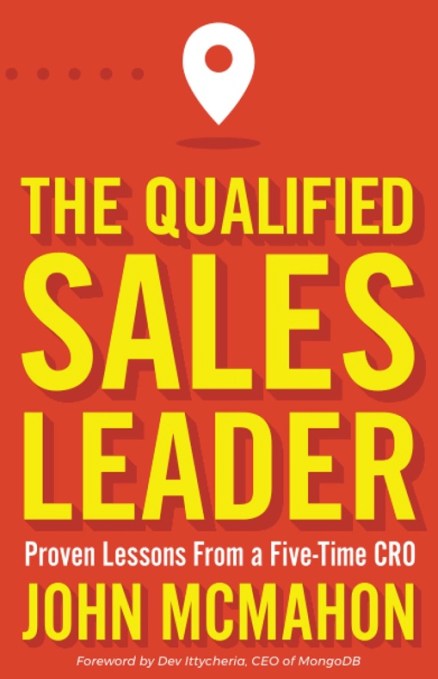
Image Credits: John McMahon
Recommended by Venrock’s Brian Ascher, who said he’s “given this to many of my portfolio CEO and CROs,” as well as by Chase Roberts, principal at Vertex Ventures, via Tessa Chen: “Most founders that raise capital are looking to grow and scale their sales teams. They have to hire their first sales leaders, but many don’t know where to start, especially in enterprise SaaS. Chase has been sending this book rec to a few of our founders for practical tips on creating a sales motion from the ground up.”
This Is How They Tell Me the World Ends: The Cyberweapons Arms Race, by Nicole Perlroth
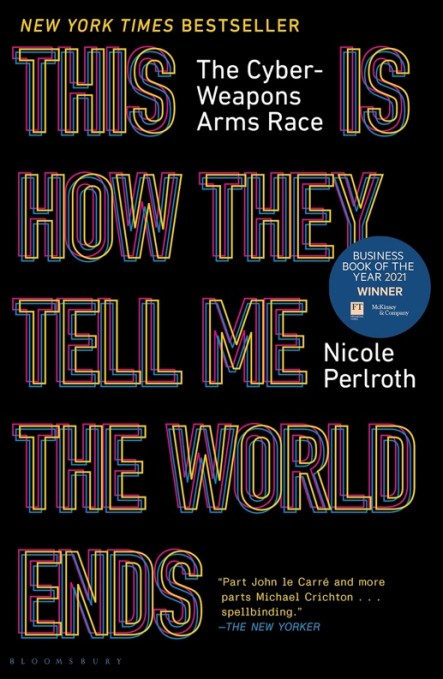
Image Credits: Bloomsbury Publishing
Recommended by Jake Chapman and Zach Coelius, this book carries blurbs from Kara Swisher and Nick Bilton, so it appears to be one that crosses the technology-media divide that we occasionally have to treat like a DMZ. The gist is that the market for zero-day cyber weapons is not what it once was. In the old days, the United States controlled the arsenal. At great expense, but who cares. Then it lost control of the zero-day world. And what comes next, people say, is staggering.
Bad Blood: Secrets and Lies in a Silicon Valley Startup, by John Carreyrou

Image Credits: Knopf
Daisy Garcia at JetBlue Ventures recommended it alongside Reeves Wiedeman’s “Billion Dollar Loser: The Epic Rise and Spectacular Fall of Adam Neumann and WeWork,” describing both books as “good reminders to invest in what you know and also fun.” Alex and Anna both read “Bad Blood,” and from our desks, this book is the rare must-read in the business book pantheon. You must read it to understand how far things can go off the startup rails, and, frankly, learn a hell of a lot about the world of business.
Recommendations we’d like to read next
An Ugly Truth: Inside Facebook’s Battle for Domination, by Sheera Frenkel and Cecilia Kang, recommended by Amy Cheetham

Image Credits: Harper
Next year, we’ll add a section for books that we bought and have on our shelves but have yet to start. “An Ugly Truth” is one such book. Alex bought a copy when it came out and has been promising himself since that he will stop reading fiction and get around to it. So far, so bad, but it’s still a book that feels like a mandatory read.
Why? Because Facebook is hardly giving up on its long-term goals. The company is shifting its growth model somewhat, but has hardly gone through a DNA-level change regarding how it considers its political setup (one owner, led by the blind) or operational goals (all your eyes are belong to us). We should take this one off the shelf and read it. You, too.
Radical Candor: How to Get What You Want by Saying What You Mean by Kim Scott, recommended by Tamara Steffens
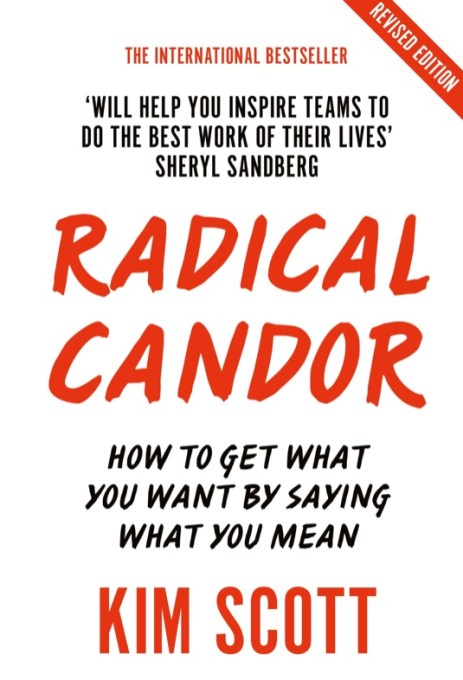
Image Credits: Pan Books
This one has been on Anna’s reading list ever since she listened to the “Radical Candor” podcast, which distills the book’s ideas into a conversational format. But whatever medium you choose, make sure you don’t stop at the title, or you might misunderstand the message. Being radically candid is not about being brutal; it is a form of kindness, because honesty beats niceness.
This could apply to many areas in life, but this is definitely business content, and especially relevant to the startup and tech world. Author Kim Scott is a former Apple and Google executive and knows a thing or two about leadership — we are not surprised that VCs are reading. “The book provides great guidance on delivering effective feedback — whether it’s positive or negative,” Steffens noted. “It has helped me recommit to passing quickly when I’m not convinced of the opportunity — and to deliver that message clearly, so there’s no room for confusion.”
Empire of Pain: The Secret History of the Sackler Dynasty, by Patrick Radden Keefe, recommended by Amy Cheetham
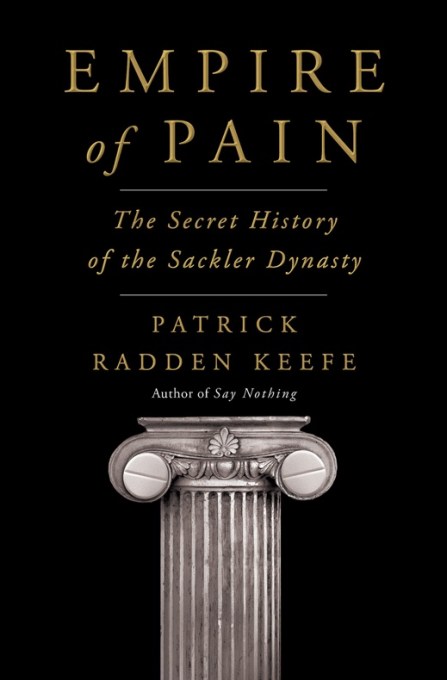
Image Credits: Doubleday
Maximizing value creation for shareholders is, at times, not a very good idea. That’s because the cost of doing so in particular situations creates such heavy societal burdens that it’s a clear net-negative for humanity. A few examples that come to mind include the oil industry hiding its knowledge of global warming for decades, the tobacco industry fighting the obvious truth that smoking is cancerous and the recent lobbying efforts by alcohol companies to combat cannabis legalization. The impact of those actions was unchecked carbon emissions, lots of cancer deaths and miserable rates of alcoholism.
And then there are the Sacklers. Not that we want to diminish the impact of the above shareholder-value-creating actions, but the Sacklers might have them beat. If you’re not aware, the Sackler dynasty helped foment an opioid addiction epidemic, recycling some of their ill-gotten gains into charitable donations — the standard billionaire method of hiding the source of their wealth with some media-friendly wrapping paper. We want to read this book to better understand just how things went so wrong, for so long.
The Aristocracy of Talent: How Meritocracy Made the Modern World by Adrian Wooldridge, recommended by James Clark
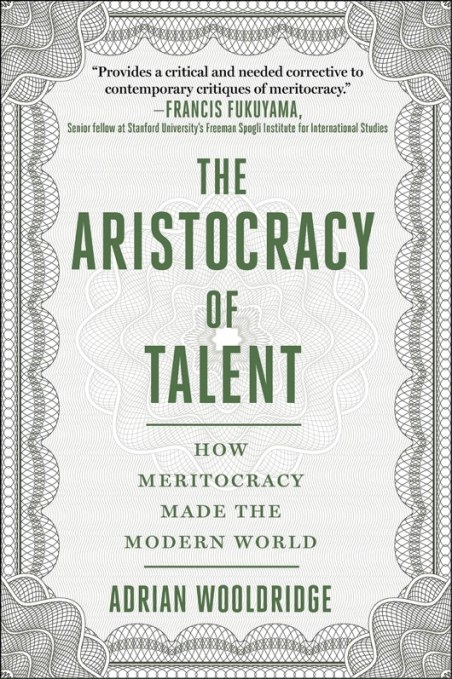
Image Credits: Skyhorse
“The Aristocracy of Talent” comes with a recommendation from Molten’s James Clark, but also with a blurb from one of Anna’s favorite thinkers, Steven Pinker. Here’s what he wrote about Adrian Wooldridge’s latest book: “This unique and fascinating history explains why the blame now being piled upon meritocracy is misplaced — and that assigning responsibilities to the people best able to discharge them really is better than the time-honored customs of corruption, patronage, nepotism and hereditary castes. Wooldridge upends many common assumptions and provides an indispensable back story to this fraught and pressing issue.”
We are all for upending assumptions here, especially when the topic is so frequently brought up in our tiny bubble — and we are curious to read more.
The Infinite Machine, by Camila Russo, recommended by Jenny Lefcourt

Image Credits: Harper Business
So there’s this idea in the market that the blockchain world is akin to a new internet. There are some issues with the idea, chiefly that blockchain tech runs on the internet, making it at most a layer-two effort for the web. Still, the concept that what today’s hackers are building will tear up the past and rewrite the future is strong.
Enter “The Infinite Machine,” which digs into the Ethereum blockchain, which some compare to an infinite computer or machine. We have our questions. For example, how did the web3 kids manage to build a computer that costs so much money to simply access? Snark aside, it’s worth taking the time to understand precisely why some folks are so rabidly bullish about the crypto market. They might be right!
The Wires of War: Technology and the Global Struggle for Power by Jacob Helberg, recommended by Jake Chapman
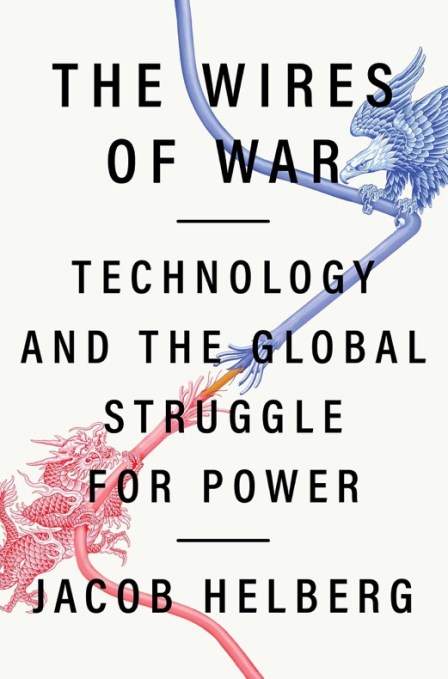
Image Credits: Avid Reader Press/Simon & Schuster
You may have heard about this book on TechCrunch: Our colleague Connie Loizos interviewed its author a couple of months ago. Their conversation covered key themes of the book — Silicon Valley, China, Russia — and made us keen to find out more, though not particularly reassured. From Connie: “Helberg lays out how China’s ‘techno-totalitarian’ regime may be first impacting the Chinese people (its ‘first victims,’ he says), but why its efforts to increasingly control the software and the hardware of the internet are a real and present and fast-escalating danger to the U.S. and democracies everywhere.” Having written quite a bit about China in 2021, and being aware that it will likely play some part in 2022, this makes a great candidate from our reading list.
Other recommended business books
- All We Can Save: Truth, Courage, and Solutions for the Climate Crisis, edited by Ayana Elizabeth Johnson and Katharine K. Wilkinson, recommended by Ted Dillon.
- Alpha Girls: The Women Upstarts Who Took On Silicon Valley’s Male Culture and Made the Deals of a Lifetime by Julian Guthrie, recommended by Daisy Garcia.
- Cable Cowboy: John Malone and the Rise of the Modern Cable Business by Mark Robichaux, recommended by Vivek Ramaswami.
- Disunited Nations: The Scramble for Power in an Ungoverned World by Peter Zeihan, recommended by Frank Sands. Sands told TechCrunch that as the world changes rapidly, “geography and demographics explain a lot about the past. They also can predict a lot about the future. Understanding both is a critical part of successful investing.”
- Gandhi: The Years That Changed The World, 1914-1948 by Ramachandra Guha, recommended by Vivek Ramaswami.
- How To Do Nothing: Resisting the Attention Economy by Jenny Odell, recommended by Monique Villa. Villa noted that as “VCs, founders and tech talent discover new cities to call home and build companies,” this book “challenges our pre-COVID definitions of place and how we interact with our surroundings.”
- Investing: The Last Liberal Art by Roberg G. Hagstrom, recommended by Irad Dor.
- Leading Clarity: The Breakthrough Strategy to Unleash People, Profit, and Performance by Brad Deutser, recommended by Aziz Gilani.
- Levers: The Framework for Building Repeatability into Your Business by Amos Schwartzfarb and Trevor Boehm, recommended by Aziz Gilani.
- Mindf*ck: Cambridge Analytica and the Plot to Break America by Christopher Wylie, recommended by Scott Stanford.
- Mission Economy: A Moonshot Guide to Changing Capitalism by Mariana Mazzucato, recommended by Reed Sturtevant. A bit surprising to get a recommendation of a book that deals with societal goals, but Sturtevant said that the book helped him “think about how the public sector can bring intention and directionality to technology innovation by ‘tilting the playing field.’” He went on to explain that the author “works to define a framing of intent that is neither too broad nor too narrow and that is centered around outcomes.”
- More Money Than God: Hedge Funds and the Making of a New Elite by Sebastian Mallaby, recommended by Aziz Gilani.
- R.E.D. Marketing: The Three Ingredients of Leading Brands by Greg Creed and Ken Muench, recommended by Kip Knight. Knight told TechCrunch that this is one of his favorite books.
- Right Within: How to Heal from Racial Trauma in the Workplace by Minda Harts, recommended by Lolita Taub.
- Super Founders: What Data Reveals About Billion-Dollar Startups by Ali Tamaseb, recommended by Ali Tamaseb. This title is one of two self-recommendations, but we suppose it’s fine to talk one’s own, ahem, book.
- Superforecasting: The Art and Science of Prediction by Dan Gardner and Philip E. Tetlock, recommended by Daisy Garcia. Garcia calls the book “informative,” adding that “we are all forecasters in work and life” in that “everyone tries to invest in things before they trend.”
- The Cold Start Problem: How to Start and Scale Network Effects by Andrew Chen, recommended by Andrew Chen and Shannon Kelly. Our second self-recommendation. Alex has a copy of this that he started but is still stuck somewhere in the opening Uber recollections.
- The Goal by Eliyahu Goldratt and Jeff Cox, recommended by Rachel Star. Star told TechCrunch via email that this is her favorite book, adding that she first read it for an engineering class and rereads it yearly.
- The Ideal Team Player by Patrick Lencioni, recommended by Ted Dillon.
- The Innovators: How a Group of Hackers, Geniuses and Geeks Created the Digital Revolution by Walter Isaacson, recommended by Vivek Ramaswami.
- The Key Man: The True Story of How the Global Elite Was Duped by a Capitalist Fairy Tale by Simon Clark and Will Louch, recommended by Aziz Gilani.
- The Kill Chain: Defending America in the Future of High-Tech Warfare by Christian Brose, recommended by Sandeep Bhadra. We like this recommendation because we agree with Bhadra that “cybersecurity is increasingly becoming the strategic battlefield in geopolitics.”
- The Origin of Wealth: The Radical Remaking of Economics and What it Means for Business and Society by Eric D. Beinhocker, recommended by Sean Fanning.
- The Outsiders: Eight Unconventional CEOs and Their Radically Rational Blueprint for Success by William N. Thorndike, recommended by Bernardo Novick.
- The Psychology of Money: Timeless Lessons on Wealth, Greed, and Happiness by Morgan Housel, recommended by Lolita Taub.
- The Ride of a Lifetime: Lessons Learned from 15 Years as CEO of the Walt Disney Company by Robert Iger, recommended by Vivek Ramaswami.
- Thinking in Bets: Making Smarter Decisions When You Don’t Have All the Facts by Annie Duke, recommended by Arvind Purushotham. We’re surprised that more poker books didn’t make the list. But Purushotham brought one to us, so we made sure to include it. Per the investor, the book, written by “World Series of Poker champion-turned-business consultant Annie Duke, explains why it’s essential to embrace uncertainty when we make decisions.” That may seem counterintuitive, but as Purushotham noted, “whether you’re deciding which company to invest in, which product to build or which growth strategy to follow, the key to placing the best bets is accurately assessing what you do and don’t know, and accepting that great decisions don’t always lead to great outcomes — because luck always has a hand to play.”
- Walt Disney: The Triumph of the American Imagination by Neal Gabler, recommended by Blake Bartlett.
- What Great Salespeople Do: The Science of Selling Through Emotional Connection and the Power of Story by Michael T. Bosworth and Ben Zoldan, recommended by Astasia Myers.
- You’re Not Listening: What You’re Missing and Why It Matters by Kate Murphy, recommended by Vanessa Colella. Colella provided a somewhat longer-than-usual explanation for this title, which we’re including in its entirety:
“At Citi Ventures, we like to say that ‘culture is the backbone of innovation,’ and as Citi’s Leadership Principles make clear, a culture of innovation begins with creating space for everyone’s insights and ideas to be shared and heard. That, in turn, starts with listening. The best-selling book ‘You’re Not Listening’ describes how difficult true listening is, despite — or perhaps because of — our constant access to digital communication channels and engagement opportunities. The book provides an important road map for reversing this trend and can help build a strong foundation for driving empathy, innovation and transformation.”

